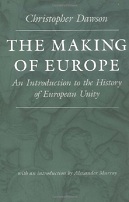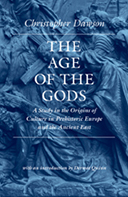Introducing the historical works of Christopher Dawson
Christopher Dawson read Modern History at Oxford from 1908 – 1911. He was fortunate in having a broad-minded tutor, Ernest Barker, who later described him as having “the mind and equipment of a philosophical historian above any contemporary or pupil” and encouraged him to study whatever interested him personally.
Although Dawson had already conceived the idea of writing a history of culture in 1909, he did not publish his first book until the age of 40. Up until then he led the life of a freelance scholar, reading deeply and widely in the fields of history, sociology and religion, and building up the necessary materials to launch his vision of history onto the world. His first book – The Age of the Gods, a study of the world’s ancient civilizations – was the initial step in the realization of this vision. It was followed by Progress and Religion (1929) and The Making of Europe (1932), a work which reinterpreted what used to be known as the “dark ages” and provided a coherent vision of the significance of the early medieval period.
The success of The Making of Europe was followed by other studies of medieval Christendom, such as Medieval Religion, based on the Forwood Lectures given at Liverpool in 1934, and the later Medieval Essays (1954) which added a further six essays to the earlier work. This interest in the middle ages, however, never led him to become a specialist, a route which he rejected throughout his life.
His other historical works reflect the breadth of his interests, from a study of the ideological origins of the French Revolution (The Gods of Revolution) to a work on the 19th century Oxford Movement (The Spirit of the Oxford Movement). The diversity of his historical interests can also be seen in many of his essays, where he shows himself equally at home writing about Confucius, Islamic mysticism or the fall of the Oriental empires as he does when examining religion in the middle ages or politics in the 20th century.


